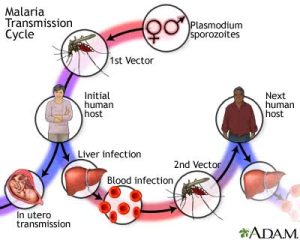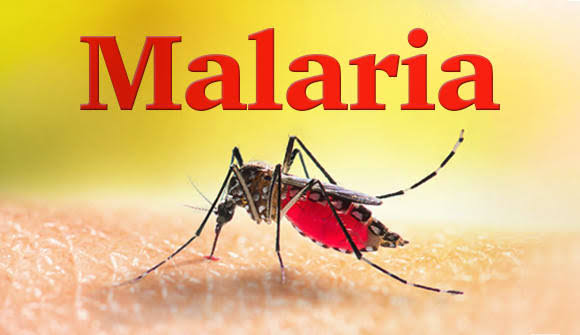In the small village of Lufuno, malaria had long cast its dark shadow, earning the ominous nickname “NightHaze.” A young woman named Amina lay stricken, her once-vibrant spirit dimmed by relentless fever and chills. Just as hope seemed to fade, Dr. Emmanuel arrived with a new treatment combining innovative medication and traditional remedies. Despite the suspense and uncertainty that followed, Amina’s family clung to the doctor’s unwavering belief in her recovery. Slowly, the haze began to lift as the treatment took effect, and Amina’s strength returned.
Weeks later, Amina stood outside her hut, the morning sun casting a golden glow over her rejuvenated village. Her recovery symbolized a triumph over the NightHaze, transforming the village’s fear into a story of resilience and hope. Inspired by Amina’s journey, the community united against the disease, proving that even in the darkest nights, the light of perseverance and new treatments can bring forth a brighter dawn.
What is Malaria?
Malaria is a serious and sometimes fatal disease caused by parasites of the genus *Plasmodium*, transmitted to humans through the bites of infected female Anopheles mosquitoes.
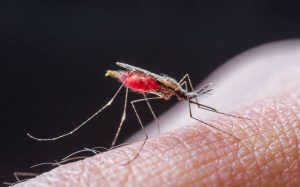
Malaria is caused by parasites of the genus Plasmodium. The most common species that infect humans are:
1. Plasmodium falciparum
2. Plasmodium vivax
3. Plasmodium malariae
4. Plasmodium ovale
Among these, Plasmodium falciparum and Plasmodium vivax are the most prevalent and widely distributed globally. Each species has its own specific characteristics and geographic distribution, influencing the severity of symptoms and treatment approaches.
In malaria, fever typically manifests with a temperature ranging from 38°C (100.4°F) to 40°C (104°F) or higher during paroxysms (periodic episodes of fever). This cyclical fever pattern is a hallmark symptom, especially in infections caused by Plasmodium falciparum and Plasmodium vivax
The symptoms of malaria typically appear 7-30 days after being bitten by an infected mosquito. The common symptoms include:
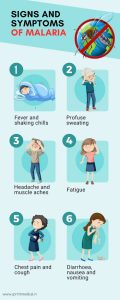
1. Fever: Often recurring and sometimes accompanied by chills.
2. Headache: Often severe.
3. Joint and muscle pains:Can be debilitating.
4. Fatigue: Feeling very tired.
5. Nausea and vomiting: Especially common in children.
6. Sweating: Often profuse, accompanying fever episodes.
In severe cases, malaria can lead to complications such as organ failure, seizures, coma, or death, particularly if not treated promptly and appropriately. It’s crucial to seek medical attention if you suspect you have malaria, especially if you have traveled to or live in an area where malaria is prevalent.
Prevention
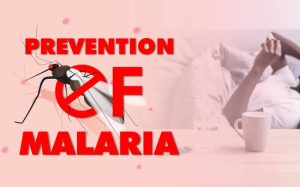
1. Mosquito Avoidance:
– Use insect repellent containing DEET on exposed skin.
– Wear long-sleeved shirts and long pants, especially during dusk and dawn when mosquitoes are most active.
– Sleep under mosquito nets treated with insecticide, particularly if staying in accommodations without screened windows or doors.
2. Chemoprophylaxis:
– Take antimalarial medications as prescribed if traveling to areas where malaria is endemic. The choice of medication depends on the specific destination and risk factors.
3. Environmental Control:
– Eliminate mosquito breeding sites by draining standing water, covering water storage containers, and using larvicides or insecticides where appropriate.
4. Personal Protection Measures:
– Consider using indoor residual spraying (IRS) with insecticides in areas with high malaria transmission.
– Seek prompt medical attention if you develop symptoms of malaria, even if you have been using preventive measures.
Treatment
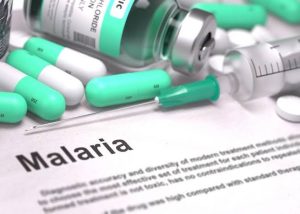
1. Antimalarial Medications:
– Chloroquine: Effective against Plasmodium vivax and Plasmodium malariae in regions where they are sensitive to the drug.
– Artemisinin-based Combination Therapies (ACTs):Recommended as first-line treatment for uncomplicated malaria caused by Plasmodium falciparum, as it is effective and generally well-tolerated.
– Other Antimalarials:Depending on drug resistance patterns and species involved, other medications like mefloquine, atovaquone-proguanil, or quinine may be used.
2. Treatment of Severe Malaria:
– Severe cases, especially those caused by Plasmodium falciparum, may require hospitalization and intravenous (IV) antimalarial medications such as quinine or artesunate.
– Supportive care to manage complications such as organ dysfunction or severe anemia may also be necessary.
3. Follow-Up and Monitoring:
– After treatment, patients should be monitored to ensure complete clearance of the parasites.
– In regions with high transmission rates, preventive measures (such as chemoprophylaxis) may be recommended to reduce the risk of recurrence.
